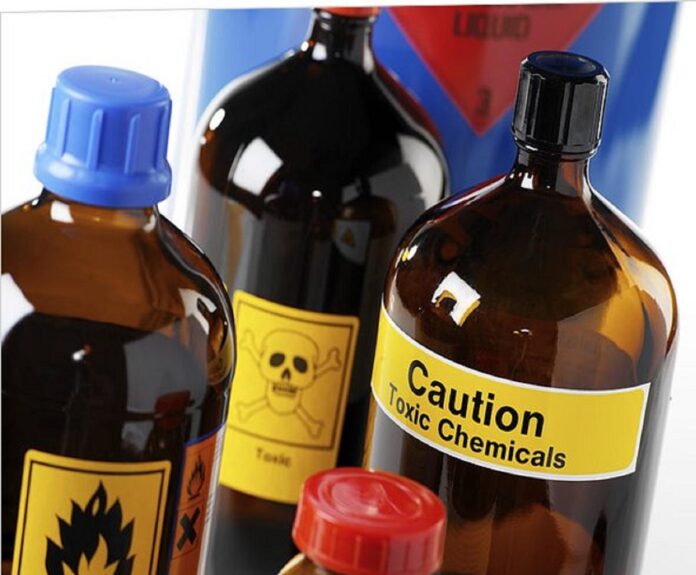Exposure to agrochemicals puts many farmworkers at risk of various occupational diseases. The exposure may be as a result of workers own negligence, inadequate knowledge and safety systems. There are reports of acute cases with symptoms typical of exposure to agrochemicals. To eliminate such hazards, we need to take safety precautions in agrochemicals handling and usage.
Common agricultural chemicals (agrochemicals) include fuels, solvents, insecticides, herbicides, fungicides, fertilisers and veterinary chemicals. Farmers need to take care when storing, transporting, using and disposing of chemicals to make sure of their own safety, their neighbours’ safety and that of the environment. (betterhealth.vic.gov.au)
Read also: Inorganic Fertilizer: Advantages and Disadvantages
Precautions during purchase
- First, choose trusted agrochemical dealers.
- Acquire only the required quantity if you do not have a safe storage place. Example; Insecticides may come in 250ml or 1lt packages for a single application.
- Reject leaking containers, loose or torn bags. Watch out for all signs of breakage. Chemical spills are very dangerous to contact.
- Look out for clear and approved labels, otherwise, do not buy.
Precautions during storage
- Do not store agrochemicals close to the residence.
- Always keep chemicals in original containers or make sure they are always well labelled.
- Keep agrochemicals very much away from food or feed.
- Keep away from the reach of children and livestock.
- Do not expose agrochemicals to direct sunlight or rainwater.
- Do not mix different agrochemicals in storage. eg. mixing weedicides with pesticides. You must arrange them well and show their place in the storage room/space.
Precautions during handling
- Do not transport chemicals with food materials.
- Do not carry them on your head, shoulder or on your back.
Precautions when preparing solution to apply
- Use clean water.
- Use protective gear to protect the nose, eyes, mouth, ears, hands and other parts of your body. Wear hand gloves, respirators, caps during the preparation and application of the chemical solution. Feet must also be protected boots or polyethene.
- Make sure protective gear is not contaminated with chemicals.
- Read and understand application rates and rules on the container. Consult an expert if do not understand the label.
- Always use chemicals at required rates.
- Do not taste or smell solution smell to test its concentration. It is poisonous to the body.
- Do not eat while preparing the solution.
- Avoid skin contact with chemicals when opening the container. If there is contact, wash immediately with plenty of clean water.
Read also: Types of Inorganic Fertilizers
Precautions with equipment to use
- Use the right equipment, tools and materials to apply agrochemicals.
- Do not use leaky and defective equipment? Avoid using torn gloves and other wears.
- Use the right kind of nozzle for knapsack and all kinds of sprayers.
- Never blow clogged-nozzle with the mouth.
- Do well to use separate sprayers for weedicide and insecticide applications.
- Select the right kind of equipment.
- Make sure the sprayer is not leaking or defective.
- Select the right kind of nozzle.
- Do not blow or clean a clogged nozzle with the mouth. Use a brush and clean with water.
- Never re-use empty chemical container, no matter how well-washed, for any other purpose
Precautions when applying chemicals
- Always apply recommended rates.
- Avoid application on hot sunny days and strong windy days.
- Do not apply chemicals against wind direction.
- Avoid application just before the rains and after the rains.
- Do not use buckets and container used for mixing chemicals for domestic purposes.
- Do not allow workers or animals to enter fields immediately after spraying.
Read Also: Why is Farm Mechanization Important in Agriculture? Challenges and Way Forward
Precautions on disposal after agrochemicals application
- Do not drain leftover solutions nor wash sprayers and chemical containers in water bodies.
- Used or empty chemical containers should be burnt or crushed and buried.
- Wash the sprayer and bucket with soapy water after spraying.
IN CONCLUSION
We believe, sticking to these Precautions in Agrochemicals Handling will go a long way to help farmers save themselves and the environment from many dangers posed by the use of agrochemicals. However, the list of precautions is not exhaustive.
We appreciate your input by adding to the list using the comment form. Let us share and save our farmers and the environment.
Reference:
Basic Precautions in Pesticide Usage (http://agropedia.iitk.ac.in)


